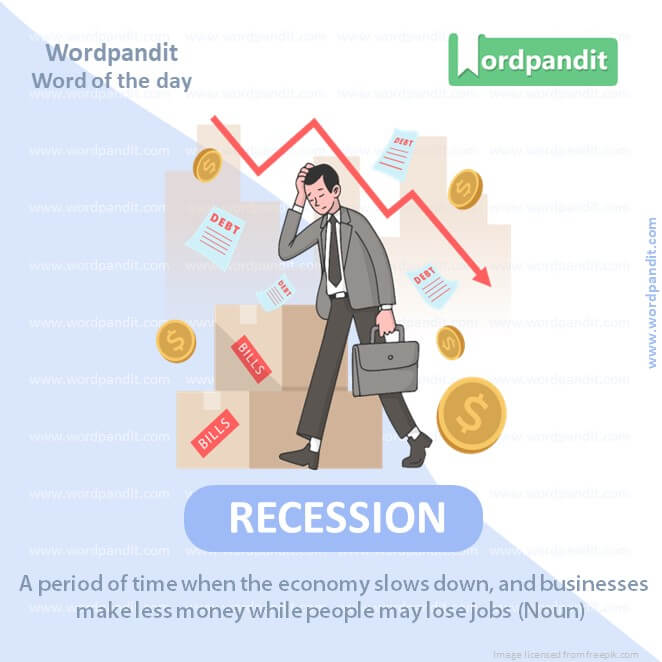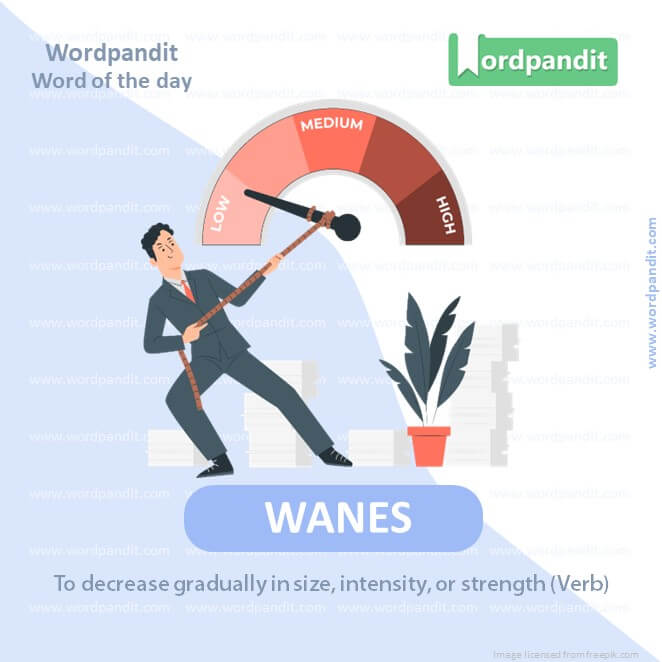Daily Vocabulary Words: List of Daily Used Words
Hi there. Welcome to this special section @ Wordpandit.
Our endeavour here is straightforward: highlighting important daily vocabulary words, you would encounter in The Hindu. This is your repository of commonly used words; essentially, we are posting a list of daily used words. Hence, this has significant practical application as it teaches you words that are commonly used in a leading publication such as The Hindu.
Visit the website daily to learn words from The Hindu.

WORD-1: TRIPLE WHAMMY
CONTEXT: Triple whammy. The Indian investor’s brush with the ‘impossible trinity’
SOURCE: The Hindu-Business Line
EXPLANATORY PARAGRAPH: Imagine you are playing a video game and you get hit by one monster, then another one, and then another one, all very quickly. Ouch! That’s like getting a “Triple Whammy.” It means three bad things happening very close together, making things really difficult for you.
MEANING: Three negative events or situations that happen at the same time or one after another, making the overall problem much worse. (Noun)
PRONUNCIATION: TRIP-ul WHAM-ee
SYNONYMS: Triple blow, triple setback, threefold hit, triple punch, triple disadvantage, triple hardship, triple trouble
USAGE EXAMPLES:
1. Losing his job, getting sick, and having his car break down was a triple whammy.
2. The company faced a triple whammy of declining sales, increased competition, and internal scandals.
3. The athlete suffered a triple whammy during the final match.
4. The family had to deal with a triple whammy when their house was damaged by a storm, their pet got lost, and their vacation got canceled.

WORD-2: RECESSION
CONTEXT: The rate hikes in India lag well behind the US Federal Reserve’s push to raise rates. India remains reluctant to increase rates due to the fear of causing a recession (possibly due to the next round of elections in 2024).
SOURCE: The Hindu-Business Line
EXPLANATORY PARAGRAPH: Imagine you have a lemonade stand and suddenly fewer people are buying your lemonade. Even your neighbors have less money to buy toys or treats. That’s what happens during a “Recession”—it’s like everyone’s lemonade stand is not doing well, and people have less money to spend on things.
MEANING: A period of time when the economy slows down, and businesses make less money while people may lose jobs. (Noun)
PRONUNCIATION: reh-SESH-un
SYNONYMS: Downturn, slump, decline, contraction, slowdown, economic downturn, depression
USAGE EXAMPLES:
1. Many people lost their jobs during the recession.
2. Businesses struggled to survive in the recession.
3. The government took steps to address the recession.
4. Families had to tighten their budgets because of the recession.

WORD-3: BACKSTOP
CONTEXT: Through fiscal and monetary policy measures, India has tried to backstop the slide of the INR against the US dollar through half-hearted capital control efforts.
SOURCE: The Hindu-Business Line
EXPLANATORY PARAGRAPH: Imagine you are playing baseball, and there’s a fence behind the catcher. This fence stops the ball from going too far if the catcher misses it. That fence is like a “Backstop.” It’s something that helps stop bad things from getting even worse.
MEANING: A support or safeguard put in place to prevent a negative outcome. (Noun)
PRONUNCIATION: BACK-stop
SYNONYMS: Safety net, safeguard, fallback, cushion, barrier, preventative measure, security
USAGE EXAMPLES:
1. The parents served as a backstop for their children’s safety.
2. The government acted as a backstop for the failing banks.
3. The new law acts as a backstop against pollution.
4. The teacher was the backstop for students struggling with the new topic.

WORD-4: WANES
CONTEXT: The global monetary tightening regime suggests the onset of a “funding winter”. The excess liquidity sloshing around in the US markets seems to be drying up with the fall of SPACs (Special Purpose Acquisition Companies) and other highly leveraged financial instruments. Moreover, with the US interest rates reaching a 22-year high, the attractiveness of equity investments in emerging markets like India wanes. The inevitable repercussion is the cessation of “sticky” equity investments.
SOURCE: The Hindu-Business Line
EXPLANATORY PARAGRAPH: Imagine you have a bright, glowing lantern, but over time it starts to shine less brightly. We say the light “Wanes” when it gets dimmer or weaker. It’s like when you get tired, and your energy goes down.
MEANING: To decrease gradually in size, intensity, or strength. (Verb)
PRONUNCIATION: waynz
SYNONYMS: Diminishes, declines, fades, shrinks, lessens, dwindles, subsides
USAGE EXAMPLES:
1. As the day ends, the sunlight wanes.
2. His enthusiasm for the project waned over time.
3. The power of the king waned as he grew older.
4. As the medication took effect, her pain waned.

WORD-5: INEVITABLE
CONTEXT: The global monetary tightening regime suggests the onset of a “funding winter”. The excess liquidity sloshing around in the US markets seems to be drying up with the fall of SPACs (Special Purpose Acquisition Companies) and other highly leveraged financial instruments. Moreover, with the US interest rates reaching a 22-year high, the attractiveness of equity investments in emerging markets like India wanes. The inevitable repercussion is the cessation of “sticky” equity investments.
SOURCE: The Hindu-Business Line
EXPLANATORY PARAGRAPH: Imagine you’re sliding down a slide. Once you start, you can’t stop yourself from reaching the bottom. That’s “Inevitable.” It means something is going to happen no matter what, like winter coming after fall.
MEANING: Certain to happen and impossible to avoid. (Adjective)
PRONUNCIATION: in-EV-it-uh-buhl
SYNONYMS: Unavoidable, certain, sure, inescapable, fated, destined, preordained
USAGE EXAMPLES:
1. It was inevitable that they would find out the truth.
2. The inevitable outcome of the game disappointed the fans.
3. She accepted the inevitable and prepared for the challenge.
4. Aging is an inevitable part of life.
WORD-6: REPERCUSSION
CONTEXT: The global monetary tightening regime suggests the onset of a “funding winter”. The excess liquidity sloshing around in the US markets seems to be drying up with the fall of SPACs (Special Purpose Acquisition Companies) and other highly leveraged financial instruments. The inevitable repercussion is the cessation of “sticky” equity investments.
SOURCE: The Hindu-Business Line
EXPLANATORY PARAGRAPH: Imagine you drop a stone into a pond. The stone makes waves that spread out across the water. Those waves are like “Repercussions.” It means something happens because of something else, like how the waves happened because you dropped the stone.
MEANING: The effects or consequences that happen as a result of an action or event. (Noun)
PRONUNCIATION: ree-per-KUH-shun
SYNONYMS: Consequences, effects, fallout, outcomes, results, aftershocks, impact
USAGE EXAMPLES:
1. The decision had serious repercussions for the company.
2. There were immediate repercussions after the law was passed.
3. She didn’t think about the repercussions of her actions.
4. The environmental repercussions of pollution are severe.
WORD-7: GRAPPLES
CONTEXT: Despite being a major food producer with extensive food security schemes and the largest public distribution system in the world, India still grapples with significant levels of food insecurity, hunger, and child malnutrition.
SOURCE: The Hindu
EXPLANATORY PARAGRAPH: Imagine you’re trying to climb a tricky jungle gym. You’re grabbing on, trying to figure out the best way to get to the top. That’s like “Grapples.” When you grapple with something, you’re trying really hard to understand it or deal with it, like a tough puzzle.
MEANING: To struggle with something in an effort to understand, solve, or deal with it. (Verb)
PRONUNCIATION: GRAP-uhlz
SYNONYMS: Wrestles, contends, struggles, copes, tussles, confronts, tackles
USAGE EXAMPLES:
1. She grapples with difficult math problems.
2. The team grapples with various challenges during the project.
3. He grapples with his emotions after the breakup.
4. The government grapples with the issue of climate change.
WORD-8: MUTINY
CONTEXT: On June 24 this year, Yevgeny Prigozhin, the leader of the Russian private military company, the Wagner Group, marched his troops to within 200 kilometres of Moscow, protesting against the Russian Defence Ministry. The mutiny ended within a day with the intervention of Belarusian President Alexander Lukashenko.
SOURCE: The Hindu
EXPLANATORY PARAGRAPH: Imagine you and your friends decide not to listen to the teacher and instead make your own rules for the classroom. That’s like a “Mutiny.” It means when people in a group go against the person in charge, like a ship’s crew going against their captain.
MEANING: A rebellion against authority, particularly among soldiers, sailors, or others in a similar group. (Noun)
PRONUNCIATION: MEW-tin-ee
SYNONYMS: Rebellion, revolt, insurrection, uprising, coup, sedition
USAGE EXAMPLES:
1. The sailors staged a mutiny against the captain.
2. There was a mutiny in the prison.
3. The employees considered mutiny against their unfair manager.
4. Historical tales often recount the dramatic mutiny on ships.
WORD-9: EXILED
CONTEXT: On June 24 this year, Yevgeny Prigozhin, the leader of the Russian private military company, the Wagner Group, marched his troops to within 200 kilometres of Moscow, protesting against the Russian Defence Ministry. The mutiny ended within a day with the intervention of Belarusian President Alexander Lukashenko. The Wagner Group was exiled to Belarus in exchange for criminal immunity.
SOURCE: The Hindu
EXPLANATORY PARAGRAPH: Imagine if you’re told you can’t be in your home or your town anymore and you have to go live somewhere else far away. That’s called being “Exiled.” It means you are sent away and you can’t come back for a long time or maybe ever.
MEANING: To be forced to leave one’s home or country, usually as a punishment or for political reasons. (Verb)
PRONUNCIATION: EX-iled
SYNONYMS: Banished, expelled, deported, ostracized, outcast, removed, displaced
USAGE EXAMPLES:
1. The king was exiled from his own country.
2. She was exiled for speaking out against the government.
3. After the war, many were exiled from their homes.
4. He lived in exile for many years.
WORD-10: IMMUNITY
CONTEXT: On June 24 this year, Yevgeny Prigozhin, the leader of the Russian private military company, the Wagner Group, marched his troops to within 200 kilometres of Moscow, protesting against the Russian Defence Ministry. This was the most noteworthy challenge to the regime of Russian President Vladimir Putin ever since he took overpower in 1999. The mutiny ended within a day with the intervention of Belarusian President Alexander Lukashenko. The Wagner Group was exiled to Belarus in exchange for criminal immunity.
SOURCE: The Hindu
EXPLANATORY PARAGRAPH: Imagine you have a super shield that stops you from getting sick when people around you have a cold. That’s like “Immunity.” It means your body can fight off certain germs so you don’t get sick, or sometimes it means you can’t get in trouble for doing something.
MEANING: The ability of the body to resist or fight off diseases and infections; also, a legal protection against prosecution or penalties. (Noun)
PRONUNCIATION: ih-MYOO-nih-tee
SYNONYMS: Resistance, protection, safeguard, defense, shield, exemption
USAGE EXAMPLES:
1. Vaccines help in building immunity against diseases.
2. The diplomat has immunity from prosecution.
3. Her immunity to the virus surprised the doctors.
4. The witness was granted immunity in exchange for testimony.
Vocabulary Words
Language acquisition is a crucial aspect of communication that allows individuals to express their thoughts accurately. At the epicentre of this process lies the task of mastering vocabulary words. But how does one efficiently learn new vocabulary words? Let us elucidate.
Initially, encountering vocabulary words in their natural habitat – a text – is one of the excellent ways to learn. Regular reading fosters an environment where we understand vocabulary words in various contexts and nuances. This method takes the complexity of language into account and helps students internalize vocabulary words by seeing their real-world applications.
Then, using a ‘vocabulary words bank’ can be significantly beneficial. Creating and consistently updating a list of vocabulary words, along with their meanings, synonyms, and antonyms, and a sentence exemplifying their usage will enhance your understanding. This systematic approach ensures easy revisions and aids in long-term retention of vocabulary words.
To ensure long-lasting memory retention, utilizing mnemonic devices is a game-changer. They provide a unique and personal creativity to twist and turn vocabulary words into memorable images, sounds, or clever associations, making the task of recalling definitions fun and effective.
Additionally, the key to solidifying vocabulary words into your memory includes consistent usage in your daily conversations, writing, and other productive pursuits. By consistently using vocabulary words, you bridge the gap between remembering them and actively applying them.
Lastly, nurturing a sense of curiosity about the roots of words, their history, or evolution can significantly contribute to learning vocabulary words. This intriguing knowledge provides depth to the learning process, making the entire journey of exploring vocabulary words enjoyable and educative.
In conclusion, the pursuit of acquiring vocabulary words should involve a blend of reading, maintaining a vocabulary word bank, employing mnemonics, practicing the use of these words, and a dash of curiosity about the language. When embraced, these methods transform the task of learning vocabulary words from a mere memorization exercise into an engaging explorative journey.











